- Medicine
- Luxembourg, Esch-sur-Alzette
- Centre Hospitalier Emile Mayrisch
- 07/2023 – 10/2023
Application process
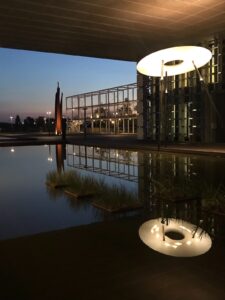
© Lea Elsholz
After having done an internship („Famulatur“) in France earlier in my study program, I wanted to return to a French-speaking country. One might argue about whether or not that applies to Luxemburg – but more of that later. A friend from university, originating from Luxemburg, highly recommended all Luxemburgish hospitals (there’s only 3 of them) for an internship. Unfortunately, I had already missed the application deadline for the CHL in Luxemburg city – that is the in-country PJ application deadline of the University of Heidelberg, Germany, that CHL is affiliated to as academic teaching hospital. Luckily, the University of Saarland in Homburg, Germany, was very cooperative and offered one of their still-open places for my surgical rotation at Centre Hospitalier Emile Mayrisch (CHEM) in Esch-sur-Alzette. As I am studying at RWTH Aachen University they just required a copy of my last exam („M2“) and some general information (the usual health certificates etc.). All other communication was led by the responsible person for the medical students at CHEM.
Accomodation & Living expenses
Exchange students get offered free accomodation in relative proximity to the CHEM, organised by the hospital. There was a 150€ security guaranty that is reimbursed some days after the end of the internship if everything is ok with the flat. Alternatively, one gets 400€/month instead of an accomodation. In Luxemburg, it’d be kind of a miracle to rent a flat short-time on these terms… it’s only interesting for those who have family or friends in Luxemburg they can stay with, as e.g. Luxemburgish medical students studying abroad would do. The flat was a shared apartment in a only some-year old building for up to 6 flat mates. During my stay, I only had 1 flat mate for the last 3 weeks. The student before me was living with up to 2-3 flat mates at a time – as far as I heard, it would rarely happen that the flat was fully booked. There are 6 rooms that all open on a long balcony and have their own bathrooms. At the end of the balcony, there is a common room with shared kitchen (2 sinks, 2 fridges etc.), cooking space and microwave. In the basement, there is washing machines and dryers (3€ each). The flats are located in Belval, an emerging urban space 2-3 km from Esch, close to the French border. There is shopping centers, restaurants, a cinema, bus stops and the train station all in <10 minutes walking distance.
Longer-term interns (several months) seem usually to get offered this type of accomodation. There were also 2 international students doing 4-week internships that lived in another shared apartment with students from different programs somewhere else in Esch.
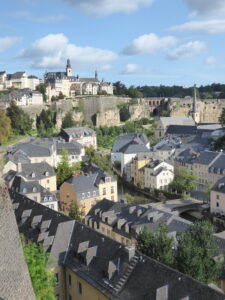
© Lea Elsholz
The public transport is free for everyone in all of Luxemburg (meaning the whole country, including the city as well as regional trains) for some years now, so there aren’t any costs for taking buses or trains. Also, there are e-bike stations that can be freely used with a personal card (no fee), mostly, these are more or less ridable and there’s a lot of e-bike stations all over the region. The program is called „Vel’ok“. As I spent my summer doing the internship, I often took the bike from or to work. This is especially nice as there’s a newly built bridge for bikes and pedestrians linking Belval and Esch-sur-Alzette (the „Velodukt“).
In exchange for the free transport, shopping prices are about 1.5x the German ones.
Fortunately, the hospital also offers free meals to the medical students, limitless – so if you really try, you could have a quick breakfast in the morning, then lunch in the cafeteria and also buy a sandwich for the evening. The offer in the cafeteria is quite ok, vegetarian options are rather scarce so there’s not much difference to the hospital cafeterias I got to know in Germany.
Everyday life / the internship
As usual in surgery, my days started early at about 7.15 am. We did get all clothes, an own phone, access cards and an own account for the intra-hospital digital patient-care system from the hospital. I spent half of my internshiop in orthopedics/trauma surgery and the other one in general & vascular surgery. I also got to see some operations by the plastic surgeons, both aesthetic and reconstructive ones. In the morning, I would go to the OR where the surgery program started at about 7.30 am. Only in general surgery, the responsible doctor (which is the teaching responsible of the University of Saarland) wants the medical students to do rounds on his patients before joining the team in the OR.
In most of the Luxemburgish health system and all of CHEM, the doctors are independent and also the interns (= german „Assistenzärzt:innen“) are employed by the doctors and not the hospital (similar to german „Belegärzt:innen“). Thus, the surgeons see their patients either in their doctor’s office or in consultation in the hospital’s polyclinic, operate on them and are responsible for the post-operative treatment as well as the follow-up. Therefore, there is no department chiefs, collective rounds or department meetings. Most of the doctors work together in groups, sharing expenses for their office and helping each other out when on holiday etc. From what I experienced, this system reduces competitive behavior between doctors while also producing more diverse treatment concept due to less hierarchies also concerning the details of patient care.
There also is no intern solely responsible for the ward, so ward-related work is done before, after or in between surgery (and yes, that results in a lot of wo
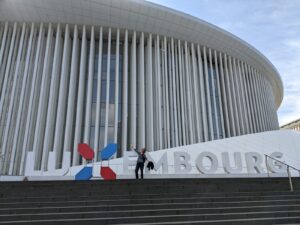
© Lea Elsholz
rk for the interns – on the other hand already 1st-year interns spend a lot of time in the OR compared to German interns).
We students were expected to show up in the OR and participate in the surgeries. In ortho/trauma I was quite free to choose every day which doctor and surgery I wanted to work with/see. In general/vascular, I was mentored by one of the interns and mostly followed his rotation plan. We usually weren’t planned as assistants for surgery, though sometimes doctors asked for us to assist when they were short on interns. All other times, most of the doctors were really nice, let us scrub in/do 2nd assistance and gave explanations.
On the practical plan, the interns usually let me do the skin and sometimes subcutaneous sutures. Apart from the usual „passive“ surgery assistance, I also do smaller tasks like take out some osteosynthetis material or do a varice stripping. In the policlinic, I was cleaning and bandaging wounds, taking out sutures etc.
There wasn’t really regular teaching sessions though there is 2 conferences students are expected to attend, the vascular conference on Mondays from 4 to 4.30 pm and the Morbidity&Mortality conference on Wednesdays from 4 to 4.30 pm where students rotate doing presentations of either clinical cases or disease-treatment related content. There was a really good 2 hrs workshop on how to treat chronic wounds, organized by the hospital’s wound management team that I’d highly recommend.
Lunch break was nearly always possible for us students, though you often had to organize it yourself as most surgeons just operated until the end of the program (around 2.30 pm).
We were always welcome to join consultations in the policlinic. The emergency patients were covered by emergency doctors, so there were no surgeons regularly assigned to the emergency room. Still, students doing their surgical or internal rotation could also go there.
I was surprised by the really good atmosphere (of course there are always some exceptions or bad days) in ortho/trauma, re-examinating my prejudices about what to expect in a team of (mostly male) surgeons. Sadly, I got to taste some of that chauvinist-discriminating vibe when switching to general/vascular and once more got used to invent all kinds of reactions on non-appropriate „jokes“. Apart from that, I really felt welcomed by everyone, doctors as nurses and medical assistants in the OR.
Speaking of – if you’re a linguophil, Luxemburg is definitely worth a visit: Having French and Luxemburgish as official languages, Luxemburger communicate in wild combinations of Luxemburgish, German, French, Portuguese and Italian, naming just the most common (mother) tongues. For students from Hungary and Ukraine, they also switched to English, leaving me with a language bursting headache for the first weeks until I got used to it – and really enjoyed the Babel situation. A lot of nurses originate from France, Belgium or Luxemburg, so speaking French is nice for interdisciplinary communication and also patients. The surgeons were mainly German or French speaking as there is no full medical curriculum in Luxemburg.
Free time / Tips
To be honest, I spent my first 2 week-ends recovering from work – it was my 3rd rotation and still, getting up at 6 am, together with the physically at least medium-demanding work in the OR and the new environment consumed my energies. After that, I usually went on trips on Saturdays and chilled on Sundays – it’s really hard to do anything else than hiking in Luxemburg on Sundays as most restaurants etc. are closed for the day.
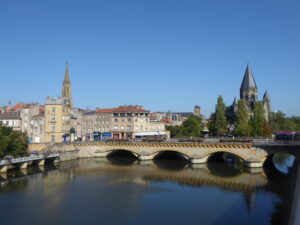
© Lea Elsholz
Luxemburg has really beautiful and diverse nature: I went hiking in the north around Clervaux. There, I also visited the great photo exhibition „The Family of Man“ by Edward Steichen which belongs to the UNESCO World Document Heritage. I highly recommend the Mullerthal trail in the south-east, the so-called Small Luxemburg Switzerland. It’s a beautiful hiking trail that can be adapted in various ways and leads through amazing sandstone rocks, crossing forest and creeks. In summer, the „Lac de la Haute-Sûre“ is the place to go to enjoy canoying or swimming surrounded by Auenland-like landscape in very clean water – it’s actually the only free water (bigger lake/river) in the country. Close to Esch, there is a nature reservation called „Ellergronn“ that offers several small hiking trails. The whole Luxemburg south is called „Red Rock Region“ due to all the iron ore deposits that is the basis from which a long industrial story of the region emerged.
Speaking of: there’s two gigantic furnaces that Belval is built around. After having been switched off in the late 90s, they were built into a museum / historical site that can be visited. The view from the middle platform of one of the furnaces is definitely worth the steps and offers another inspiring perspective on the many works of known architects rising around the furnaces and hosting the university as well as private labs and enterprises.
Usually not very fond of urban spaces, I really liked Luxemburg city (shortly called „the city“ among Luxemburgers). The city is build on two levels (upper and lower town) that are linked by a LOT of stairs and steep pathways. The lower town has nearly village vibes with a lot of trees and two creeks flowing through, while the upper town is has a really nice city center, a lot of shopping possibilities (mind your wallet, though), several churches, the grand-duke’s palace of course and again a lot of parks. For those interested in underground research, the „Kasematten“ (kind of catacombs) are a tourist highligh not to miss. On the other side of the Pfaffendal is Kirchberg: Plane fields for a long time, the growing
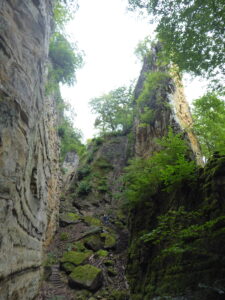
EU facilities became to much for the inner city of Luxemburg in the early 2000s so they were moved to the opposite hill and a new district emerged, called Kirchberg. Besides impressive modern architecture hosting EU institutions, there’s also a lot of international companies, an arena and Luxemburg Philharmonie.
The cities of Metz (F), Nancy (F) and Trier (D) lie all within a 1-2 hrs drive with public transport and are also worth a trip.
There is a rich cultural program in Esch-sur-Alzette and Luxemburg in general (mind the summer break though). In Belval, there is a big concert hal („Rockhal“), a theatre in Esch and several clubs, theatre, opera etc. in the Luxemburg city. For sports, there is a free climbing hall meant to open soon in Belval itself, there is also indoor climbing possibilites in Luxemburg city. I discovered a really nice dance studio in Schifflange (2-3 km from Esch/Belval), offering Yoga, Pole Dance and Aerial Silk. There’s also a public pool in Esch though unfortunately just an indoor one – Luxemburgers are more likely to have their private pool in their garden, I was told, although I’m afraid that is more of a Luxemburg cliché…
Conclusion
In the hospital, there was a remarkable summer break in August when most doctors were on holiday and there was a really limited program in the OR. All other time of the year, the place is quite busy so I wouldn’t recommend it if one is looking for a beach & chill surgical rotation. If you’re interested in surgery, not afraid of languages and value a good working atmosphere, Luxemburg is the place to go 😊 For more exotic specialities like neurosurgery you’d have to apply to CHL (Heidelberg’s application deadline is June of the year preceding your rotation abroad, as to my knowledge). Also, blood samples are performed by the nurses, so you’ll actually be in the OR
I had a good time in Luxemburg, hospital- as free time-wise, and am thankful to having been supported by the Erasmus+ grant that enriched my stay by really allowing me to get to know the country also outside the hospital.


Leave a Reply